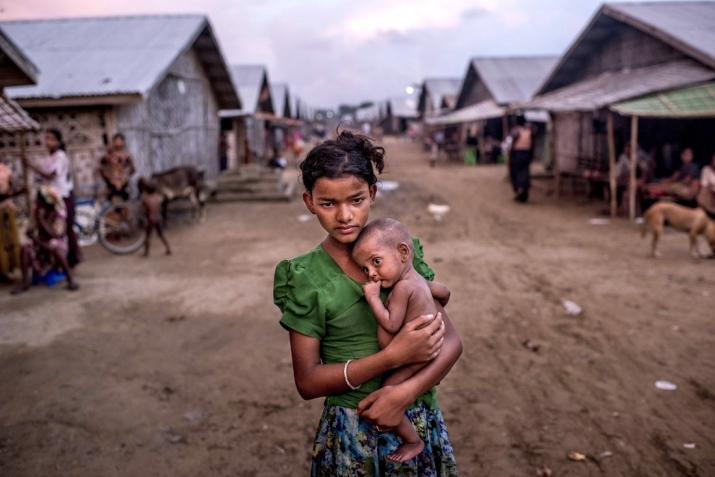NEWS
Myanmar to Form Buddhist-Muslim Commission to Address Humanitarian Crisis in Rakhine State
 Most Rohingya remain in resettlement camps, with limited access to education, healthcare, or employment opportunities. From stopgenocidenow.org
Most Rohingya remain in resettlement camps, with limited access to education, healthcare, or employment opportunities. From stopgenocidenow.orgMyanmar plans to set up a new state-level committee aimed at resolving the humanitarian crisis in the country’s western Rakhine State, home to most of the country’s population of Rohingya Muslims. A government minister said the new nine-member panel would be tasked with liaising with local communities in Rakhine as well as international parties.
Religious tensions have simmered in Myanmar for almost half a century, but came to a head with violent clashes in 2012 that killed more than 100 people. Rakhine State is one of the most sensitive and conflict-prone regions in the country, particularly since outbreaks of anti-Muslim violence in 2012 and 2013, following which 140,000 people, most of them Rohingya, were displaced. Most remain in resettlement camps, with limited access to education, healthcare, or employment opportunities.
“The plan is just under way as an introductory step and I cannot say how [the committee will be] taking action in monitoring the state’s peace and stability affairs yet,” said Rakhine State Chief Minister U Nyi Pu, adding that planning was preliminary. (Myanmar Times)
U Nyi Pu said the commission’s principle objective would be to bolster peace and stability in Rakhine and to report to the national-level Rakhine State Peace, Stability, and Development Committee, which was formed on 30 May, and is chaired by State Counselor Aung San Suu Kyi. However, according to a Reuters report at the time, “The announcement gave only the names of those on the committee and offered no details on how the group would address the state’s multitude of problems.”*
The new commission is to include three members from “the international community,” two Buddhist members, two Muslim members, and two government representatives, according to Tha Pwint, a retired Arakanese lawyer cited by The Irrawaddy magazine, which noted that the representatives of the international community were not identified.
Rohingya rights activist Aung Win said he would not be satisfied with the central government’s stance on the situation in the state until “direct action” was taken. “The day the government gets involved directly, will be the day when our problems can be solved,” he said. (The Irrawaddy)
Myanmar classifies Rohingya Muslims as stateless foreign migrants even though they have lived in Myanmar for generations. The country’s population also includes Muslims from other ethnic groups. According to the Washington, DC-based Pew Research Center, Buddhists make up about 80 per cent of Myanmar’s population of some 52 million, and Muslims just 4 per cent. The radical nationalist Committee for the Protection of Nationality and Religion (Ma Ba Tha), a collective of hardline Buddhist abbots and influential monks founded in 2013, has previously stoked religious division, asserting that Myanmar’s Buddhist population and culture is under threat from Islam. More recently, major figures from Myanmar’s mainstream political and religious communities have publically spoken out against Ma Ba Tha, saying the group’s policies are not representative of the country’s Buddhist sangha, which has some 250,000 members according to a government estimate, and do not reflect the essence of Buddhism.
* Aung San Suu Kyi to Lead Peace Effort in Rakhine Against Backdrop of Political Complications
See more
Commission on Arakan State to be Formed With Buddhist and Muslim Members (The Irrawaddy)
State-level peace, stability body planned for Rakhine (Myanmar Times)
Related
Buddhistdoor View: Reconciling Nationalism and Buddhism (Buddhistdoor Global)
Top Buddhist Authority in Myanmar Begins Moving Against Extremist Buddhist Organizations (Buddhistdoor Global)
Lone Buddhist Reaches Out to Rohingya Children in Myanmar (Buddhistdoor Global)
Aung San Suu Kyi Urges Tolerance and Unity in Myanmar’s Troubled Rakhine State (Buddhistdoor Global)














